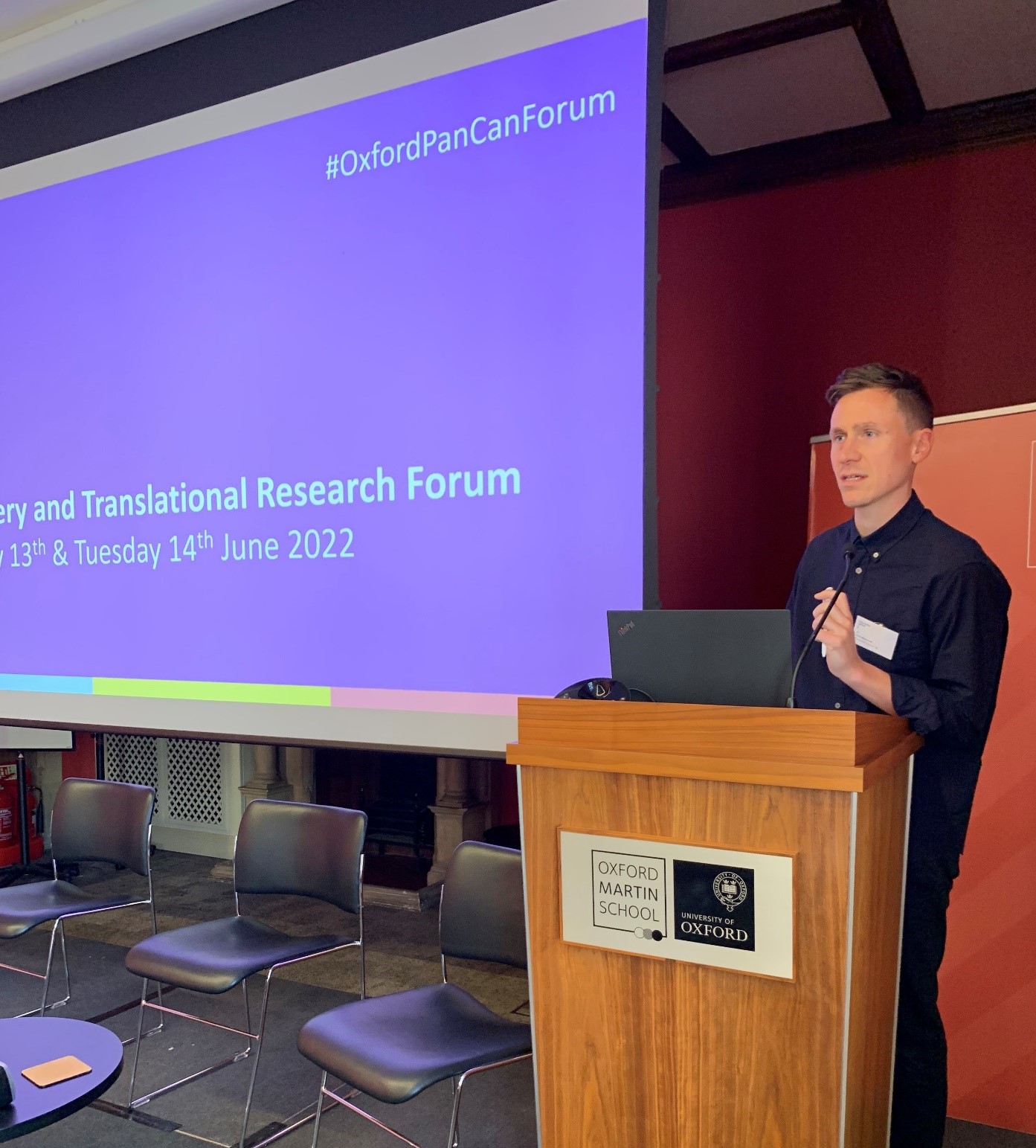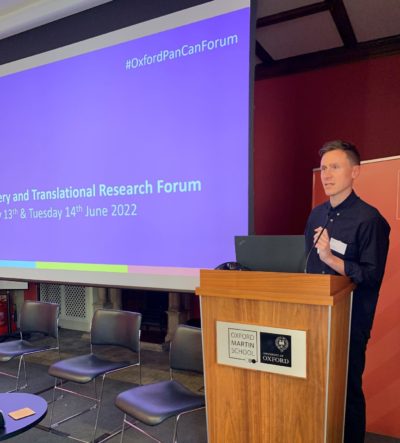



Pancreatic Cancer UK Discovery and Translational Research Forum
Monday 13th & Tuesday 14th June 2022, Oxford, UK


“Collaborations are essential because we can’t all be expert in everything”
Last month we gathered together members of the UK pancreatic cancer research community at our Discovery & Translational Research Forum, in the beautiful surroundings of Oxford.
In order to make progress in pancreatic cancer research, we need to have a thorough understanding of the processes involved in disease initiation and development. Over two days, we discussed the priority challenges faced by discovery and translational pancreatic cancer researchers in the UK, and how we can work together to overcome them.
Crucially, this forum also brought researchers together to develop networks and collaborations. These are so important to help us maximise the potential and efficiency of the pancreatic cancer research community, especially after two years of uncertainty where there have been limited opportunities to meet each other face-to-face.
Across the two days, there were some overall themes of discussion that cut across all of the sessions, which are summarised below.
Coordination and collaboration of the research community
The pancreatic cancer research community in the UK is relatively small and there is significant underfunding in this area, with pancreatic cancer receiving only 3% of the UK cancer research budget. This makes it even more important for the community to share resources, information and learn from one another. In addition, the complex biology of pancreatic cancer requires a multidisciplinary approach which brings together relevant expertise to look at the tumour holistically. Improvements in communication and sharing between the laboratory and clinical communities could not only build valuable networks, but also improve sharing of data and tissue between clinical care and research.
As Dr Giulia Biffi nicely summed it up; “Collaborations are essential because we can’t all be expert in everything”.
Models of pancreatic cancer – accuracy and access
Current animal and cell models of pancreatic cancer that are widely used in the lab are costly to create and maintain, and have some limitations in terms of how accurately they reflect the complex environment of pancreatic cancer.
Identifying what gaps there are that are not covered by existing models and developing more refined and accessible models across study areas, for example models of metastatic disease and cell models, could significantly improve the quality of research. Improved sharing and co-ordination of available models would also be hugely beneficial to the community.
Access to tissue and data
Availability of patient samples, in particular matched samples from the same patient (for example to compare markers and environment before and after treatment) is a significant problem. There is also poor access to samples from metastatic disease, where the cancer has spread beyond the pancreas. This may be for a number of reasons, including lack of co-ordination and lack of time and opportunities for NHS staff to support research by sample collection. There is also a need for better sharing and linkage of data, including imaging data.
Better utilisation of existing tissue removed during surgery, and creation of shared resources such as biobanks could provide a valuable resource to the whole pancreatic cancer community.
Complex biology of pancreatic cancer
Pancreatic cancer is tough to research, and there is still a lot that we don’t know about its biology, including fundamentals such as the cell of origin and processes involved in the transition of early pre-cancerous lesions to metastatic disease. The complexity and variation in the pancreatic cancer environment presents a significant challenge, and although we have made headway, there is still a lot more work needed.
New models, new collaborations, and more adequate technologies could help drive progress in understanding of the disease. Dedicating some time and funding to focus on the common ground in cancer biology – the underlying pathways, oncogenes and drivers – could be immensely valuable to help enrich current our understanding. There is also great potential to learn from the small number of long-term survivors of pancreatic cancer – what makes this group more likely to survive their cancer? Are there similarities in genetics and the immune system that could be used to gain new insight, improve our understanding and maybe even develop new treatments?
Pancreatic cancer is tough to treat, but as Professor Gerard Evan urged the community, “We have to keep the faith”, using the example of multiple myeloma where in recent years, the introduction of game-changing therapies has increased survival rates.
Feedback from attendees across the two days of the forum was overwhelmingly positive, and it is clear that there is huge benefit in bringing the community together at events like these to stimulate discussion and build collaborations.
I know that we have the research community committed enough to drive change; and I am certain that events like the Forum will speed up that change.
Dr Chris Macdonald, Head of Research at Pancreatic Cancer UK, said “There are a lot of unknowns and uncertainties in pancreatic cancer research. We cannot avoid the fact that developing better means of early detection and treatment, which are so greatly needed to improve the lives of people affected by pancreatic cancer, will take time and huge commitment. However, following the Forum I know and am certain of some things: I know that we have the research community committed enough to drive change; and I am certain that events like the Forum will speed up that change. It is therefore essential that we continue to support community collaboration by bringing people together at these type of regular events.”
The question on many people’s lips as we said our goodbyes was – when is the next one?
Sign up to our research newsletter to be the first to hear about upcoming events, deadlines and other news of interest to our research community.

